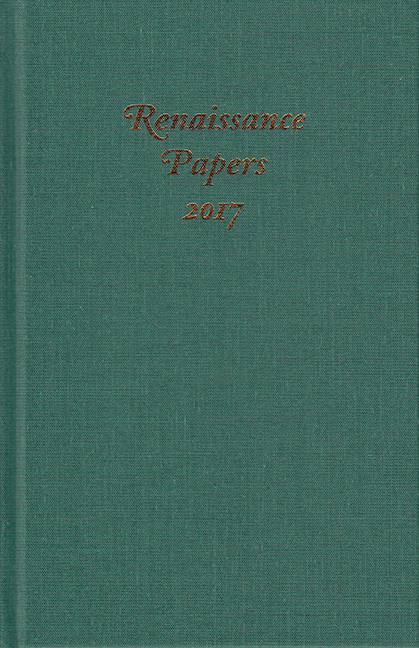Book contents
- Frontmatter
- Contents
- Dedication
- The Contested Pliability of Sacred Space in St. Paul's Cathedral and Paul's Churchyard in Early Modern London
- Classicism from Urbino: The Bichi Chapel Frescoes by Francesco di Giorgio Martini
- Visualizing the Paragone in Francisco de Zurbarán's Crucifixion with a Painter
- A Change in the Making: Shakespeare's Ovidian Sleep of Death and Display
- Old Black Rams and Mortal Engines: Transhumanist Discourse in Othello
- Dying with Speed and Felicity: Humor and Death in Book 3 of the Faerie Queene
- “If Devils Will Obey Thy Hest”: Devils in Dr. Faustus and The French Historie
- Rewriting Lucrece: Intertextuality and the Tale of Lucrece
- Economy and “Honesty” in Thomas Middleton's A Chaste Maid in Cheapside
- Glossing Authorship: Printed Marginalia in Aemilia Lanyer's Salve Deus Rex Judaeorum
- Botany and the Maternal Body in Titus Andronicus
- Unhorsing the Lustiest Challenger: Reflections on Chivalry in Richard II and Henry IV, Part 1
Old Black Rams and Mortal Engines: Transhumanist Discourse in Othello
Published online by Cambridge University Press: 04 April 2019
- Frontmatter
- Contents
- Dedication
- The Contested Pliability of Sacred Space in St. Paul's Cathedral and Paul's Churchyard in Early Modern London
- Classicism from Urbino: The Bichi Chapel Frescoes by Francesco di Giorgio Martini
- Visualizing the Paragone in Francisco de Zurbarán's Crucifixion with a Painter
- A Change in the Making: Shakespeare's Ovidian Sleep of Death and Display
- Old Black Rams and Mortal Engines: Transhumanist Discourse in Othello
- Dying with Speed and Felicity: Humor and Death in Book 3 of the Faerie Queene
- “If Devils Will Obey Thy Hest”: Devils in Dr. Faustus and The French Historie
- Rewriting Lucrece: Intertextuality and the Tale of Lucrece
- Economy and “Honesty” in Thomas Middleton's A Chaste Maid in Cheapside
- Glossing Authorship: Printed Marginalia in Aemilia Lanyer's Salve Deus Rex Judaeorum
- Botany and the Maternal Body in Titus Andronicus
- Unhorsing the Lustiest Challenger: Reflections on Chivalry in Richard II and Henry IV, Part 1
Summary
THE point of doing research projects in the humanities has always been to extend our understanding of what it means to be human. The answers to this question were of vital importance in the Early Modern period, and they continue to be for the twenty-first century, when the project of Renaissance humanism, the pursuit of human potential, has come to reside in a movement some have called posthumanism or transhumanism—the idea that we can continue to perfect ourselves in the flesh, to transform ourselves through technology. Despite the positive forecasts, we also understand that on the continuum of human actualization are also shadowy places of unmaking where our humanity may be irretrievably lost. Pico's commentary on the human condition, that we are beings of “indeterminate nature,” challenged to choose between “the power to degenerate into the inferior forms of life which are brutish” or “to rise to the superior orders which are divine” foregrounds that dark possibility. The status of the “human” is even more problematic today, thanks to advances in robotics, prosthetics, RFIDs, and artificial intelligence. Donna Haraway long ago recognized the “leaky distinction … between animal-human (organism) and machine.” Jonathan Sawday comments on the fear inherent in the erasure of stable boundaries separating the human from the mechanical: “The modern human relationship with machines, from its emergence in the earlier part of the sixteenth century down to the present, has always been tinged with a measure of unease. ‘They’ have always been nearer kin to ‘us’ than we have cared to admit; and in that lies their fascination, as well as their potential horror.”
Modern-day scholars (e.g., Courtney Lehmann in her recent work on “How Shakespeare Became Posthuman”), interested in the intersection between the Early Modern preoccupation with human potential and our own post-humanism concerns, are beginning to draw upon the vocabulary of cybernetic systems theory in an effort to map out the range spanned by our forward-looking ambition for self-making and our fears of what may be lost if we fail. In the preindustrial era, this cultural anxiety lodged itself in the possibility of a fall into animalism (hence the medieval fascination with the possibility of werewolves, still operational in the Early Modern period); in the post-industrial age, that same fear turns an anxious gaze at the loss of humanity through interface with the machine.
- Type
- Chapter
- Information
- Renaissance Papers 2017 , pp. 65 - 72Publisher: Boydell & BrewerPrint publication year: 2018

